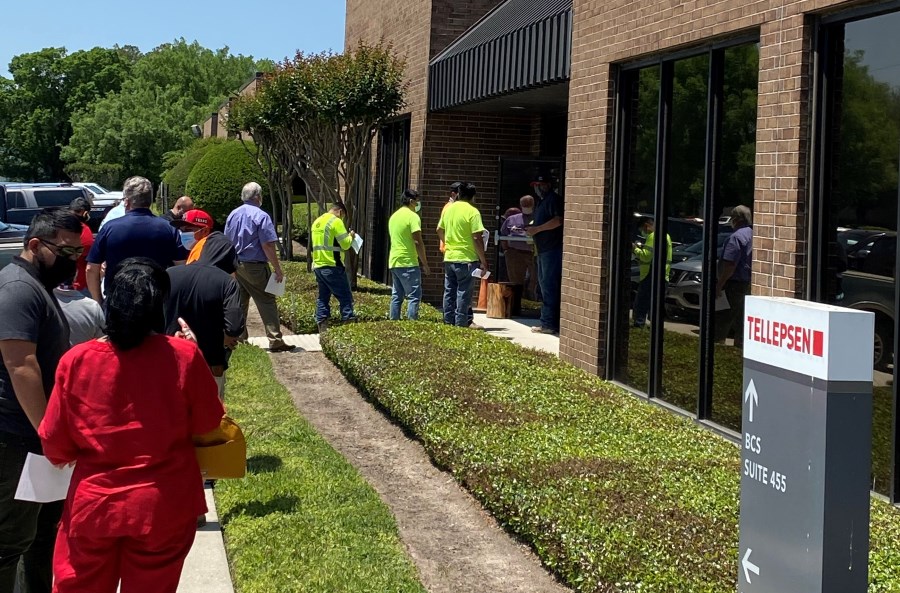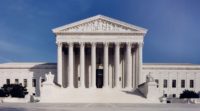A majority of U.S. Supreme Court justices appeared skeptical of the Biden Administration's legal authority to implement a COVID-19 vaccination-or test mandate with the depth and breadth of the US Occupational Safety and Health Administration's emergency temporary standard, as they heard arguments on Jan. 7 from government proponents and state and business opponents to the rule, set to take effect on Jan. 10 for employers with 100 or more in their workforces.
The emergency standard, released in November, has been fast-tracked to the high court through numerous challenges and varying decisions in lower courts on its need and statutory foundation that have left the rule in legal limbo.
At the special hearing, several justices appointed by Democratic presidents called the nearly two-year-old pandemic an unprecedented situation that would justify such a standard that affects 80% of employees—an estimated 80 million people working for the large companies.
The government's attorney, U.S. Solicitor General Elizabeth Prelogar, admitted in questioning that only one element of the standard—the one that requires masking of unvaccinated employees—takes effect as of Jan. 10, with the administration allowing large employers until Feb. 9 to have testing and vaccination compliance plans in place.
"This is something the federal government has never done before,” Chief Justice John Roberts said in response to the administration argument that the 1970 Occupational Safety and Health Act confers such broad authority. In its more than 50-year history, OSHA has issued an emergency temporary standard only 10 times, with just one affirmed by the courts.
Government Argument
Central to the government's argument before the justices is that the COVID-19 pandemic requires such broad action because of how deadly the virus can be to workers in a wide variety of workplaces. Only employers whose employees work alone at home, work almost entirely outside. such as landscapers, and have less than 100 employees would be exempted from the rule.
"OSHA has never imposed vaccination in any of the previous 10 standards," said Scott Keller, the attorney representing the National Federation of Independent Businesses and other entities, arguing for a stay of the OSHA mandate. "We do not contest that COVID is a grave danger," he said, but noted that the Philadelphia U.S. Appeals Court said that "in wielding what is supposed to be a delicate exercise of extraordinary power, the agency has to consider and explain alternatives."
Contractor groups such as the Associated Builders and Contractors, which is a party to one lawsuit, have argued that more exemptions should be available for worksites that are mainly outdoors.
Justice Elena Kagan said, in a question to Ohio Solicitor General Benjamin Flowers, one attorney representing states and employer groups who made his arguments by phone due to a recent positive COVID-19 test, that "quite clearly no other policy will prevent sickness and death to the degree that this one will."
Who is Targeted? Who is Protected?
Justice Amy Comey Barrett, however, asked businesses' attorney Keller whether the National Federation of Independent Businesses would still challenge the standard if it was targeted to individual industries and not to employers with 100 or more employees.
"Well, I think what this shows is that workplaces are different," he said. "Instead of doing an economy-wide vaccine testing mandate, for all purposes, OSHA needed to at least consider as it identified, there are certain instances ... for workplaces where there's a heightened risk, that that's where a workplace occupational [standard makes sense]."
Justice Samuel Alito asked if the emergency standard was being imposed to protect the general public or to protect the unvaccinated, with Solicitor General Prelogar, in her opening statement, answering that OSHA's standard was designed to protect the unvaccinated.
"The standard requires employers to adopt a policy that unvaccinated employees either get vaccinated or mask and test," she said. "Those are commonplace and highly effective measures that OSHA determined are essential to stopping the spread of this dangerous disease at work." adding that opponents "try to portray this standard as unprecedented, but this lies in the heartland of OSHA's regulatory authority."
When asked by Alito what damage would occur if the court stayed the mandate, even briefly for administrative purposes, Prelogar admitted that neither the administration nor OSHA knows what will happen
"A really simple question and you have the prerogative to say, 'no, we think horrible consequences are going to ensue if you issue even an administrative stay of a short period of time, and we don't think that you need to have that time to digest this case and decide it,'" Alito asked.
Prelogar answered: "I'm not going to say that, Justice Alito, if the court believes that it needs a brief administrative stay, then of course it can enter it."





